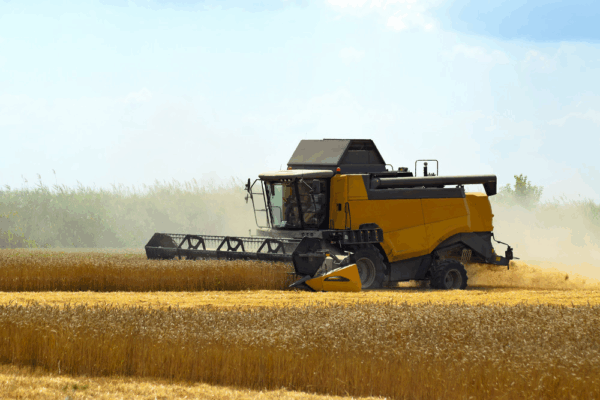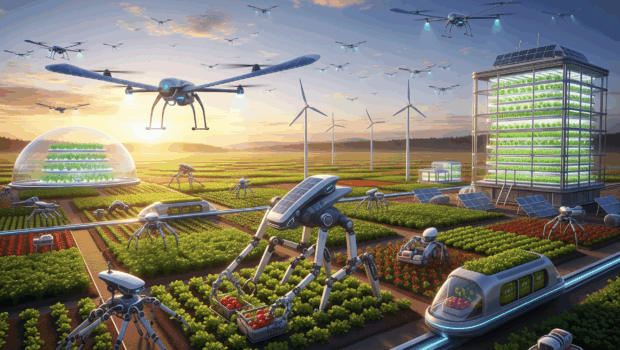The Future of Agriculture: Innovations Driving Smarter Farms
As the global population grows, the need for sustainable and efficient farming is more urgent than ever. With limited arable land, farmers are embracing innovative technologies to boost productivity, protect resources, and secure the food supply. Advances in precision agriculture, smart resource use, and climate resilience are shaping the future of farming—delivering higher yields while reducing environmental impact. This article explores the cutting-edge technologies driving smarter, more sustainable farms.

Battling Weeds and Pests With High-Tech Precision
Weeds and pests remain a major challenge for farmers. If left unchecked, they can destroy fields and reduce yields. Food crops must compete against a whopping 30,000 species of weeds, 3,000 kinds of nematodes, and 10,000 species of plant-eating insects, making effective management essential. Today, farmers use advanced tools like drones, sensors, and data analytics to monitor their fields and apply herbicides or pesticides only where needed. This precision approach minimizes chemical use, protects the environment, and boosts productivity by targeting problems early and effectively.
Biological and robotic solutions are also transforming pest and weed control. Engineered fungi and natural predators are being deployed to manage harmful insects without harming crops or beneficial species, reducing the reliance on traditional chemicals. At the same time, autonomous robots equipped with machine learning and computer vision can identify and eliminate weeds with remarkable accuracy, preserving soil health and lowering labor costs. Together, these innovations are paving the way for more sustainable, high-tech pest management strategies that protect both yields and ecosystems.
Turning Farm Byproducts Into Smart Resources
Farm byproducts, once seen as waste, are now being transformed into valuable resources through advancing technologies. Lecithin, for instance, is a byproduct gaining traction in food and industrial sectors, with its market projected to grow at a CAGR of 6.7% by 2027. This shift not only opens new revenue streams for farmers but also reduces environmental waste. Similarly, composting converts crop residues and manure into nutrient-rich soil amendments, cutting the need for synthetic fertilizers. Modern composting systems now use sensors and automation to optimize decomposition, helping farms close nutrient loops and support regenerative agriculture.
Bioenergy presents another major opportunity by turning agricultural waste into renewable fuels. Methane digesters, for example, convert animal manure into biogas, which can power farm operations or feed energy back into the grid. These technologies reduce dependence on fossil fuels, lower carbon emissions, and provide farms with greater energy independence. Together, innovations like bioenergy, composting, and byproduct valorization illustrate how agriculture is evolving toward circular economies that enhance both sustainability and profitability.
Weathering the Storm: Tech Shields for Crops
Technologies are becoming essential tools for helping farmers protect their crops from the growing threats of climate change. Hailstorms, for example, cause approximately $15 billion in damages to U.S. crops, homes, and cars annually, but innovations like protective netting and advanced materials can shield fields without blocking sunlight. Smart weather prediction algorithms give farmers unprecedented foresight, allowing them to prepare and respond more effectively to extreme weather events.
Precision farming also supports crop protection by providing detailed, localized data on soil moisture, temperature, and other conditions through satellites and IoT devices. Robotics can then implement protective measures, such as adjusting shading or distributing coverings, to defend crops from sudden weather changes. Additionally, resilient crop varieties developed through genetic engineering and advanced breeding help withstand drought, heat, and pests. By integrating these technological solutions, agriculture is enhancing sustainability, resilience, and food security in the face of climate variability.
The future of agriculture rests on the synergy of technology and sustainability. Innovations in pest management, resource efficiency, and climate resilience are creating smarter farms that boost productivity, reduce environmental impact, and support global food security. By adopting these transformative technologies, farmers can meet modern challenges while fostering a more sustainable and prosperous agricultural future. Continued investment in agricultural technology will be key to shaping the industry’s trajectory.

















